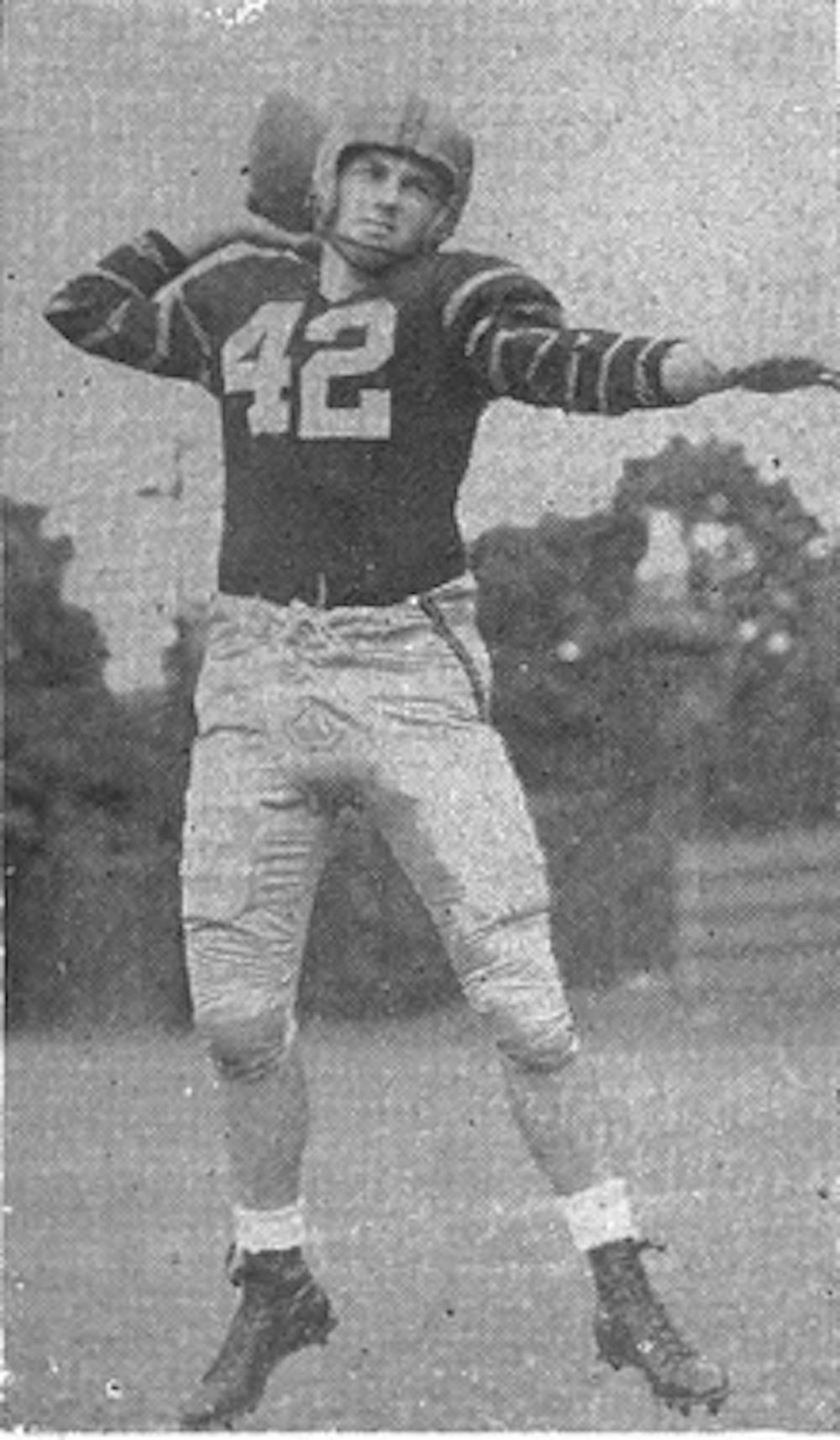Dick Kazmaier ’52, legendary tailback and Princeton’s only Heisman Trophy winner, diedThursdayin Boston at age 82.
Bob Ruxin ’76, president of Kazmaier’s firm, Kazmaier Associates, Inc.,said that the cause of death was heart and lung disease.
Kazmaier was known across the country for his prowess on the field, but he was equally famous in the Princeton community for his humility, as well as for his choice not to pursue professional football despite winning college football’s highest honor in 1951. Though he was drafted by the Chicago Bears, he turned down an NFL career for Harvard Business School. He would later serve for three years in the Navy and founded Kazmaier Associates, Inc.,a sports marketing and manufacturing firm, in 1975.
Sixty years after his graduation, Kazmaier still holds multiple school records, including the Princeton record for highest career touchdown percentage, most career offensive yards per play, most yards per play in a season, most career passing yards per attempt and highest single-game completion percentage.
His No. 42 was retired by the Department of Athletics in 2008.
Kazmaier is survived by his wife, Patricia, and five daughters: Kathy L. Donnelly, Kristen Kazmaier Fisher, Michele S. Kazmaier, Susan M. Kazmaier ’81 and Kimberly Picard ’77.
Daughter Patricia J. Kazmaier-Sandt ’86, who led the Princeton women’s hockey team to three consecutive Ivy League titles, died in 1990 of a rare blood disease. Kazmaier and the USA Hockey Foundation founded the Patty Kazmaier Award in her honor.
Director of Athletics Gary Walters ’67 called Kazmaier “one of our most accomplished student-athlete icons of the20th century” and “one of the most self-effacing individuals I have ever met.”

Indeed, “Kaz” led back-to-back undefeated Princeton teams, yet he hardly seemed to notice that his accomplishments were exceptional.
"I was neither the greatest passer nor the greatest runner, but in combination it fit very well," Kazmaier told the The Daily Princetonianwhen he wasnamed No. 2 on its list of Princeton’s all-time greatest athletes. "The system was sort of right for me. I always say that I was in the right place at the right time and with the right people."
In an interview with the ‘Prince’ last fall, Kazmaier said he was more focused on winning the next game than on celebrating after his teams defeated Harvard and Yale, leading to the celebration of a bonfire.
“We went out to win every game, and they just happened to be two that were part of the schedule,” he said last fall when asked about his attitude toward beating Harvard and Yale and bringing a bonfire to campus.

That attitude took Kazmaier far. His Princeton football career got off to a perfectly mediocre start: At five feet 11 inches talland 155 pounds, the third-string tailback got some playing time on the freshman football squad but did nothing noteworthy.
He fared better at basketball, becoming the freshman team’s leading scorer, and put his newfound confidence to use on the gridiron. After an impressive spring football season, he started every game his sophomore year and was the Ivy League’s leader in offensive yards.
From the tailback position in the single-wing offense of head coach Charles Caldwell ’25, Kazmaier took snaps and was in control of the offense, using his combination of skills to rack up yardage on the ground and through the air.
His 6.6 career yards per play and 8.2 passing yards per attempt marks remain the best in Princeton history, and even they may not be his most phenomenal record.
On Oct. 27, 1951, Kazmaier completed 88.2 percent of his passes against an undefeated Cornell team, leading an offense of which he was the only returning starter to a blowout victory over a team widely considered to be the best in the nation on his way to his second consecutive undefeated season.
Ask "Kaz" about football, however, and you are more likely to hear life lessons or instructions on steady blocking than any of his barely-believable individual performances.
“He never talked about himself as a player,” head coach Bob Surace ‘90 said. “To get anything out of him, football-wise, was like pulling teeth, because all he wanted to talk about was ‘ready-steady’ blocking form or his teammates.”
After easily winning the Heisman, Kazmaier seemed to be on the path to the NFL, but he had other plans. Believing he had gotten everything he could out of football, he went on to become a successful businessman while staying close to his Princetonian roots.
In addition to enlisting in the Navy, facilitating the implementation of Title IX and serving on the President’s Council on Physical Fitness under Presidents Ronald Reagan and George H.W. Bush, Kazmaier followed Princeton football closely, did everything he could to attend games and was a mentor to generations of coaches and players, including Surace.
“When I got the job, one of the very first emails I got was from him, which was mind-boggling to me,” Surace said. “You get chills when you think about that.”
Kazmaier spoke directly to many Princeton teams, emphasizing the importance of hard work and encouraging them to put any adversity they faced in perspective. Coming from the scrawny third-stringer-turned-Heisman-winner, that meant something.
“I think the reason that we have statues of him, and the reason 42 isretired...is not just because he was this incredible football player, but because of what he represents,” Surace said.








